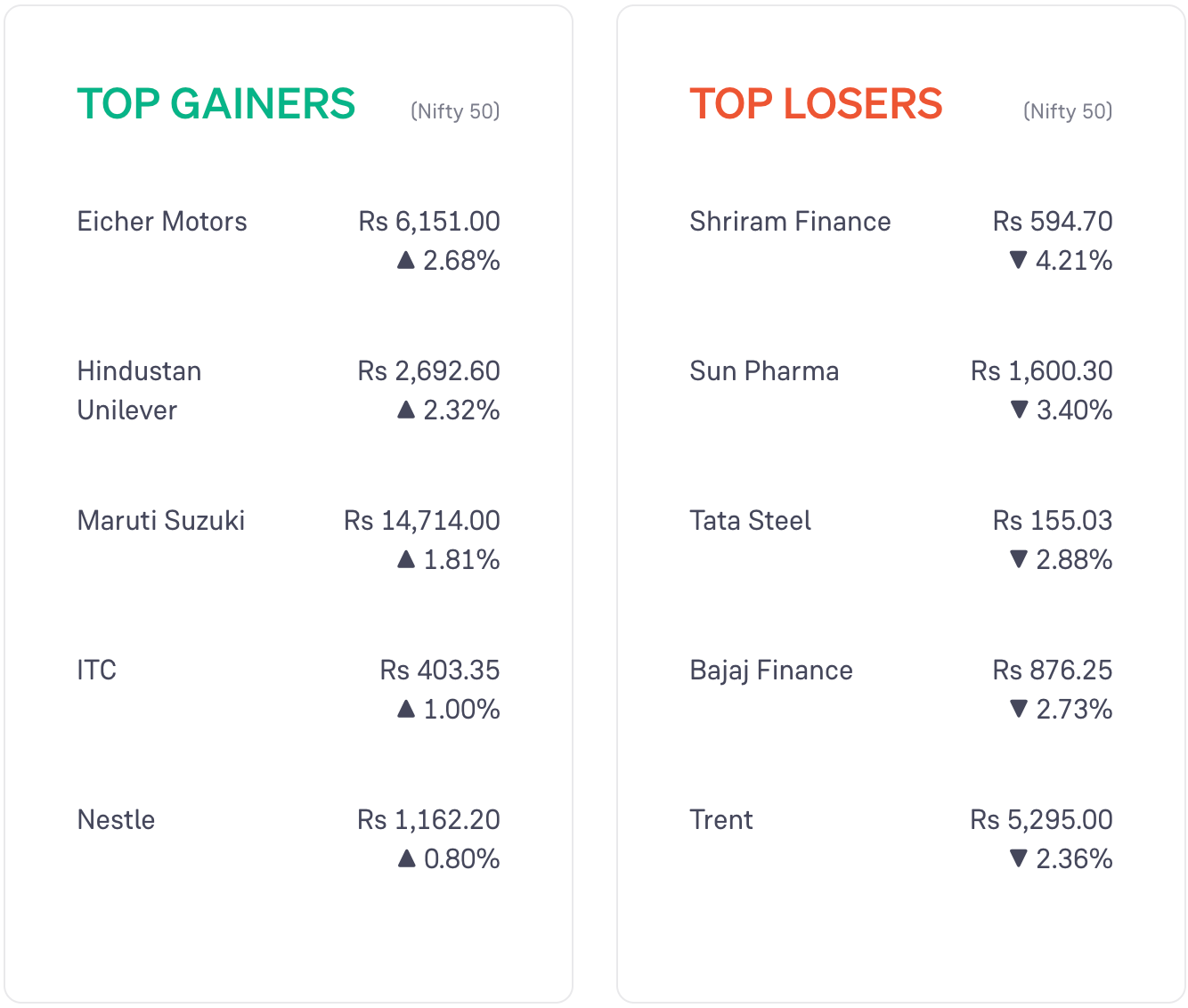Trump tariffs to begin tomorrow, Eternal receives 3 GST orders, & more — Daily Digest
Tuesday, 26 August 2025
Markets opened below yesterday’s closing point.
Nifty 50 fell immediately after opening and stayed in a range. This was mainly due to negative sentiments after the US issued a draft notice saying it will move forward with the extra 25% duty on Indian imports from 27 Aug.
All sectors’ stocks fell today except for the FMCG stocks. Realty stocks and PSU bank stocks fell the most.
Global markets: US markets fell. Asian markets showed a mixed trend. European markets fell (as of 6 pm IST).
News
The US President Trump’s 50% tariffs on Indian goods will come into effect from tomorrow (27 Aug).
Ardee Engineering got SEBI’s approval for a Rs 580 crore IPO.
Gem Aromatics IPO listed at a premium of 2.49% over its issue price and closed 1.83% down at the end of the day.
Vikram Solar IPO listed at a premium of 1.81% over its issue price and closed 7.35% up at the end of the day.
Stocks Updates
Adani Energy: incorporated a new wholly owned subsidiary Adani Electricity Puducherry Ltd.
Bajaj Finserv: incorporated a wholly owned subsidiary Bajaj AIF Trustee Ltd to act as trustee for its alternative investment business.
BPCL: plans to set up a greenfield oil refinery and petroleum plant near Ramayapatnam Port in Andhra Pradesh: company Chairman & MD Sanjay Khanna.
BSE: approved merging its subsidiaries BSE Investments Ltd and BSE Administration & Supervision Ltd into BSE Technologies Pvt Ltd, subject to regulatory approvals.
Eternal (Zomato): received 3 GST demand orders totaling Rs 17.19 crore tax, Rs 21.42 crore interest, and Rs 1.72 crore penalty for July 2017 to March 2020 period. The company plans to challenge the order.
Vodafone-Idea (Vi): said it got no government communication on stopping relief, clarifying on some media reports of its stock falling 10%.
Word of the Day
Negative Interest Rates
It is when a central bank keeps the interest rate below zero
This means that banks have to pay to keep their money with the central bank instead of earning interest on it.
It is an unconventional policy used during periods of deflation (falling prices) or economic slowdown to encourage borrowing and spending.
The main goal is to encourage banks to lend money and for people to spend or invest instead of just saving.
Mostly, it affects banks and large institutions, but it can also indirectly affect individuals by lowering returns on savings or making loans cheaper.
Countries like Japan and Switzerland have used negative interest rates to boost economic activity.
6 Day Course
Theme: why SIP works
Day 2: Tuesday
SIPs do not work in case of investments that require timing.
They work for investments that will go up over time even if the path has a few ups and downs.
Example 1: let’s say there’s a stock whose price has temporarily fallen by a big margin. But once the price recovers, it will not go much higher because its future potential is limited.
In such cases, the investment needs to be timed carefully. Here, SIPs are not helpful.
Example 2: there is a company whose long term prospects are good. But right now, its shares are a bit overvalued.
In such cases, SIPs can be helpful. They can help you keep buying through overvalued and undervalued periods.
Because of this, the risk of entering the markets at an overvalued price is low.
This effect is called cost averaging. SIPs help us average out buying costs over a long time — which is great in case of investments that will go up in the long run.
Featured Question
“When they say an IPO was oversubscribed x number of times, what does it mean?”
In an IPO, a certain number of shares are on offer.
‘Oversubscribed’ means the number of applications received to buy these shares is higher than the number of shares available.
Let’s say there are 10 shares on offer in an IPO. But different investors have applied to get 20 shares total.
This means the IPO is oversubscribed 2x.
Did you like this edition?
Leave a feedback here!






